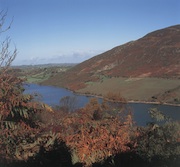
The new British Conservative Direct Ruler, Owen Paterson, has held out the prospect of allowing the the Six-County Assembly to make some tax varying decisions.
During his first full day in the north in his new role on Friday, the Conservative MP met northern political leaders.
But as he sought to build relations with republicans concerned at his unionist links, he made embarrassing comments about visiting the “deepest, wildest” parts of the north of Ireland with Sinn Fein representatives.
First Minister Peter Robinson and Deputy First Minister Martin McGuinness reported ‘a positive atmosphere’ in their hour-long talks with Mr Paterson at Stormont Castle.
Despite his new position, Mr Paterson said he would remain an openly unionist politician. “But most importantly, now in my role as secretary of state, I will continue to work with all parties,” he said.
“I spent probably more time in the deepest, wildest perts of Northern Ireland with Sinn Fein members of parliament and councillors and I want to very much carry on that.”
Challenged on whether he viewed republican areas to be the “deepest and the wildest”, he admitted that he meant the border areas of South Armagh.
“Well I think when you go down to the sort of Forkhill and Cullyhanna, you’re quite a long way from here and it feels a long way from here.”
Absurdly, he added: “But I tell you the best bread is in Crossmaglen. I always buy wheaten bread”.
Mr McGuinness sought to gloss over the gaffe. “The key point, and the point that I made to him during the meeting that I had with him, was that this British government remains loyal and true to the agreements that were made over the course of recent years. And he gave an absolute commitment that they would do that.”
The new Direct Ruler also said that British spending in the North, responsible for almost 80% of economic activity, was “unsustainable”.
“But down the road I want to develop the Northern Ireland economy, which I said is going to take at least 25 years,” he said.
“We need to work closely with devolved ministers in building up the private sector.
“I am very keen that we do publish a paper on the mechanics of possibly devolving corporation tax to the devolved institutions here.”
Such a move could pave the way for a harmonisation of corporation tax on the island of Ireland, a move long sought by northern politicians as a means of attracting the levels of investment in the 26 counties.
![[Irish Republican News]](https://republican-news.org/graphics/title_gifs/rn.gif)
![[Irish Republican News]](https://republican-news.org/graphics/title_gifs/harp.gif)

